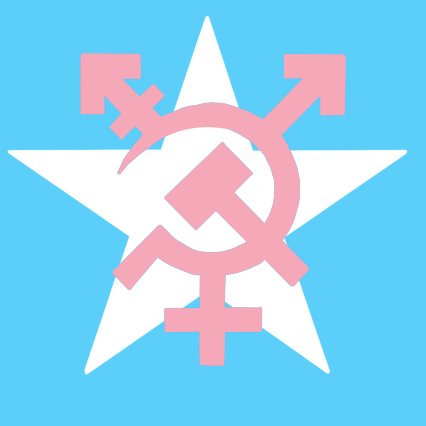Hello comrades!
I think it’s important for our comrades to have a safe place where they can ask questions about trans identities and trans issues in good faith.
The first step in garnering support is education, however asking every single trans person to constantly take on the burden of educator is, frankly, ridiculous, especially when so often the questions are not being asked in good faith, and there are very real consequences to the spread of misinformation.
As such, I know that there are likely comrades here who have questions they have been too scared to ask, or feel like it would be inappropriate to pose to some stranger.
Trans or questioning comrades are also welcome to ask questions here, of course, and are welcome to answer any questions they feel comfortable answering. The thing about the trans experience is that it is different for everyone. We all have different material conditions, we all have different interactions with ourselves and the world around us, and so, of course, there is no universal truth that governs what it means to be trans.
I can’t guarantee that we’ll have an answer for everything, and I can’t guarantee that the answers we do have will be satisfactory, but I can guarantee that as long as you are asking out of a genuine desire to inform yourself and learn more, then I will do my best to engage with you as a comrade and an ally.


I would say that things are going very well in Cuba, and going decently well in China. This is my point of view as a Spanish-speaking trans Westerner who currently lives in East Asia.
It’s important not to remove either of these countries from their historical and cultural context. The trans (and general LGBT) struggle in each of these countries is emerging out of their own unique contexts, which include their own local forms of patriarchy and heteronormativity as well as colonially-imposed forms, as well as the worldwide scientific approach that has not been totally free of incorrect theories and practices. On top of that, both countries have to deal with sabotage and concern trolling from the imperial core trying to use things like “LGBT issues” to demonize them.
In Cuba, there are many clear measures going on to address trans (and general LGBT) rights. For example there is the government organization CENESEX, which promotes sex education and LGBT rights, and, as far as I am aware, Cuba has had legal, government-funded sexual reassignment surgery available since 2008. Currently, they are reviewing the Family Code, which is a suite of progressive laws about gender, sexuality, family rights, etc. including topics like same-sex-marriage. Whether or not it passes, it’s clear that the Cuban government is taking trans rights seriously, and that the Cuban public is engaged in serious discussion over the topic.
I have less information about specific laws in China. In 2017, the Comprehensive Gender Dysphoria Clinic was opened. In 2021, The Children’s Hospital of Fudan University opened a clinic serving transgender children and teenagers in Shanghai.
Some reports I have read (from 2017 and 2020) that survey trans and other LGBT populations gives me the impression that the struggles faced by Chinese trans people are nothing out of the ordinary, at least in my view. They face opposition from their families due to traditional values, face some difficulties in accessing hormones and surgeries, and discomfort in certain public places, especially bathrooms. A majority of Chinese trans people who get sexual reassignment surgery receive it in China, but a fair percentage of them report that they experienced something negative during the process, whether that would be discrimination, or a medical issue. However, overall, I did not see any indication that extreme or horrific levels of discrimination are rampant in medical settings. It sounds fairly comparable to medical ignorance and outdated requirements I have personally seen in certain places in the West as well as personally seen in other parts of East Asia. I think also that people feel dissatisfied around the requirements/process for legal gender change, which is a common issue faced by trans people worldwide, as in the places where legal gender change is allowed, it generally includes the requirement to have had SRS, which is in contradiction with what most trans communities seem to end up wanting the law to be.
So, overall, it seems trans rights are progressing in both China and Cuba, within their own cultural/historical contexts, and at a reasonable pace on par with other countries that share similar backgrounds culturally and historically.
More details about China
There is this 2017 Chinese Transgender Population Survey Report. Their survey was, of course, looking at the problems faced by transgender people in China, so keep in mind that this is a look at China’s problems rather than successes on this issue. Also keep in mind it’s from 2017. From what I recall from the report, it seems that cultural traditions around family structure is a big struggle for a lot of trans and other LGBT people in China. While access to hormones and surgery is not completely satisfactory, it is available, but the trans community of China would like access to be improved.
Additionally, here is a 2020 national survey about general LGBT discrimination in China. Once again, it seems that traditional views on the family are one of the most dominant social problems facing China’s LGBT community, which is something that will just have to be solved through ideological struggle, education of family, support groups, etc. I believe this study also found that, consistent with other similar studies, public acceptance of LGBT people tends to improve when economic conditions improve.
More details about Cuba
Cuba has CENESEX, which is their government organization for promoting sex education and LGBT rights and education.
As far as I am aware, the state-funded sexual reassignment surgery was passed in 2008, although I haven’t looked into the details of its implementation.
Currently, the Family Code referendum is about to be reviewed, which includes things like same-sex marriage. Personally I have not looked deeply into the specific propositions in the Family Code, but same-sex marriage is a helpful thing for trans people, as well as the whole LGBT community. In any case, public consultations about the Family Code earlier this year “showed that approximately 62% of Cuban citizens are in favor of updating the constitution to provide for more inclusive legislation.”
Whether it passes or not, it’s evident that the Cuban government is taking trans and all LGBT rights seriously and has taken measures to address the things that the local LGBT community has been asking for. Now it is up to the public engage in debate and the struggle between old ideas and new ideas. That same article says: "Despite the strong political support and the positive results from the public consultation process, the new legislation still faces staunch opposition from religious groups, who were successful in overturning a similar referendum in 2019. "
if you don’t mind, what country do you live in east asia? what has the process been to acquire hormones in a foreign country, has it been hard at all? do you know what the process is like in different countries throughout east asia, or how i could research that?
deleted by creator
thank you so much for your experience!! as i ask more people and do more research it seems like the kind of thing that isn’t a big roadblock or anything, but at the same time is important enough that i 100% want to make sure it wouldn’t be a problem.